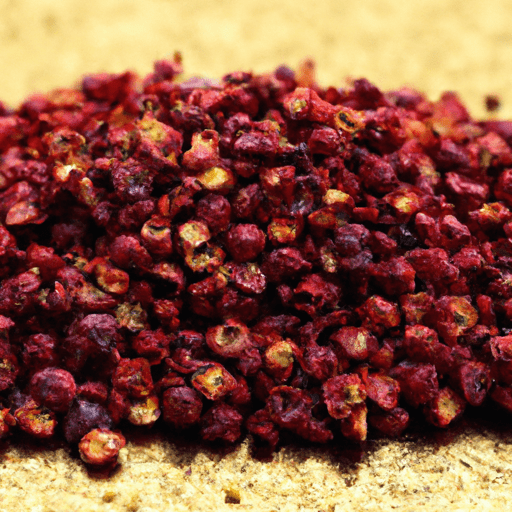Exploring the Richness of Berbere Spice: A Fiery Flavor Adventure
If you are an adventurous foodie or have a penchant for bold and vibrant flavors, then berbere spice should definitely be on your culinary radar. This Ethiopian spice blend is like no other, offering an explosion of taste and a journey into the heart of Ethiopian cuisine. So fasten your seatbelts and let’s dive into the fascinating world of berbere spice!
A Taste Sensation Like No Other
Berbere spice is a captivating blend of spices with a fiery kick that truly tantalizes the taste buds. Its flavor profile is an exquisite balance of heat, sweetness, and earthiness, creating a symphony of sensations in every bite. The primary ingredient that gives berbere its characteristic heat is none other than the mighty chili pepper. The heat can vary from moderately spicy to volcanic, depending on personal preference and the brand you choose.
Unleashing the Culinary Potential
Berbere spice is the heart and soul of Ethiopian cooking. It is an essential ingredient in countless traditional dishes, infusing them with depth and character. One of the most well-known dishes showcasing berbere is Doro Wat, a flavorful Ethiopian chicken stew. The blend also adds a unique touch to lentil stews, vegetable dishes, and even grilled meats. With berbere in your pantry, you can bring a taste of Ethiopia to your kitchen and impress your friends and family with exotic and aromatic creations.
Nutritional Wonders
Apart from its impressive taste, berbere spice also offers various health benefits. Many of the spices used in its creation, such as cumin, coriander, and turmeric, possess antioxidant and anti-inflammatory properties. Additionally, the fiery kick it provides can rev up your metabolism, promoting healthy digestion and increased calorie burning. It’s worth mentioning, however, that berbere spice can be high in sodium, so moderation is key.
A Brief Dive into History
The origins of berbere spice are rooted in Ethiopia’s rich cultural heritage. Historically, it was a prized blend passed down from generation to generation, with each family adding their own touch to the recipe. Today, berbere remains an iconic symbol of Ethiopian cuisine and is essential to the cultural fabric of the country. The exact spice composition can vary between regions and households, adding even more intrigue and diversity to this aromatic blend.
Interesting Facts about Berbere Spice
- Berbere spice is known as the “soul” of Ethiopian cuisine, capturing the essence and vibrancy of the nation’s culinary identity.
- The word “berbere” originates from the Amharic language spoken in Ethiopia, meaning “hot” or “spicy.”
- Traditional berbere spice blends can contain up to 15 or more different spices, each contributing to its complex flavor profile.
- Outside Ethiopia, berbere spice has gained popularity and can now be found in select specialty stores and online markets, allowing more people to experience its culinary magic.
In conclusion, berbere spice is a true gem in the world of spices. Its tantalizing taste, unrivaled use in Ethiopian cuisine, nutritional benefits, and rich cultural history make it a must-have for any adventurous cook. So why not embark on a culinary journey, spice up your dishes, and discover the wonders of berbere for yourself? Get ready to ignite your taste buds and explore the vibrant flavors of Ethiopia!
Berbere Spice
Origin:
- Berbere is a spice blend that originated in Ethiopia and is an essential component of Ethiopian and Eritrean cuisine.
- It is believed to have originated in the northern region of Ethiopia, but its popularity has spread throughout the country and beyond.
Ingredients:
- The primary ingredients of berbere spice include chili peppers, garlic, ginger, basil, korarima (Ethiopian cardamom), fenugreek, cinnamon, cloves, and various other spices.
- The exact combination and proportions of spices can vary from recipe to recipe or even household to household, resulting in a range of unique flavors.
Common Uses:
- Berbere is most commonly used as a seasoning for stews, soups, and sautéed vegetables, but it can also be used to flavor meats and poultry.
- It is a key ingredient in many traditional Ethiopian dishes, such as Doro Wat (spicy chicken stew) and Misir Wat (spicy red lentil stew).
- Berbere can also be used as a dry rub for grilling or as a flavorful addition to marinades.
Nutritional Benefits:
- Berbere spice blend contains several spices that offer various health benefits. For example, chili peppers may help boost metabolism and provide pain relief, while garlic and ginger have potential antioxidant and anti-inflammatory properties. However, the overall nutritional benefits depend on the specific ingredients and quantities used in each berbere recipe.
Unique Properties:
- Berbere is known for its rich and complex flavor profile, combining heat from chili peppers with earthy, sweet, and aromatic notes from the other spices.
- The spices used in berbere can vary greatly, leading to a wide range of flavor intensities and heat levels. Some versions of berbere can be quite spicy, while others may be milder.
- Traditionally, the ingredients for berbere are finely ground together using a mortar and pestle, which helps combine the flavors and create a consistent texture.
Historical Significance:
- Berbere spice has a long history in Ethiopian and Eritrean cultures, dating back centuries.
- It has played a significant role in these cuisines, not only as a flavor enhancer but also as a symbol of cultural identity and heritage.
- The exact origins of berbere spice are not well-documented, but the spice blend has been an integral part of Ethiopian cuisine for generations, and its popularity has grown internationally as more people enjoy its unique flavors.




Use the share button below if you liked it.
It makes me smile, when I see it.